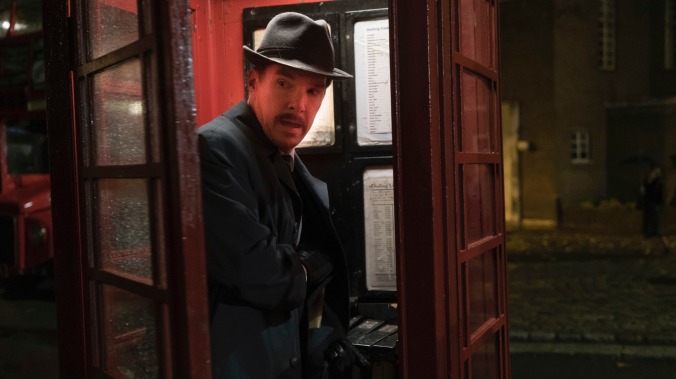Even Benedict Cumberbatch can’t make the real-life spy games of The Courier exciting

Note: The writer of this review watched The Courier on a digital screener from home. Before making the decision to see it—or any other film—in a movie theater, please consider the health risks involved. Here’s an interview on the matter with scientific experts.
Originally titled Ironbark, after a Russian asset’s code name, The Courier chronicles one of the most significant episodes in 20th-century espionage: a series of intelligence leaks that was instrumental in ending the Cuban Missile Crisis. Anyone hoping for the sphincter-clenching tension of The Americans, however, will be sorely disappointed. While screenwriter Tom O’Connor (The Hitman’s Bodyguard) has undoubtedly embellished and heightened some elements for dramatic effect, he sticks reasonably close to what actually happened, which involved such riveting spycraft as one man handing some papers to another man, right in the open. The whole idea was to avoid anything that might appear suspicious; there was still plenty of danger involved on both sides of the transaction, but everything looks downright banal, by design.
Well, except for Benedict Cumberbatch, who can’t help but look striking. Nonetheless, he plays an ordinary businessman by the almost parodically English (but absolutely real) name of Greville Wynne, who’s invited one day in 1960 to have lunch with two people (Angus Wright and Rachel Brosnahan) who claim to be from the Board of Trade. “Is it possible you actually work for a different branch of Her Majesty’s government?” Wynne eventually, nervously asks, after they suggest that he start conducting business in the Soviet Union and tell him that he’d be doing his country a great service; the movie’s single finest moment is their dead silence in response—just twin steely stares—followed by Wynne’s equally silent realization of what’s being asked of him. A Russian intelligence officer, Oleg Penkovsky (Merab Ninidze), has established contact, seeking to reveal nuclear secrets in an effort to prevent a potential war, and MI6 needs a regular means of communicating with him—somebody with no connection to any government.
Shrewd though this real-life ploy was, it presents a significant challenge to director Dominic Cooke (On Chesil Beach), who’s tasked with generating anxiety from what amounts to a series of humdrum business meetings. As Trey Parker and Matt Stone have taught us, you need a montage, and The Courier serves up several expert ones, leaning hard on shots of Penkovsky snapping photos of documents in shadowy storage rooms. Cooke also has a terrific camera sense in general, and can create a mood just by abruptly shifting angles—having one character stop another as they walk down a dark street, then cutting to a view of them at a distance, as if they’re being surveilled. Solid performances across the board don’t hurt, either, though Brosnahan is overqualified for her fairly generic role as Wynne’s American handler. Best in show is Kirill Pirogov as another intel officer who cloaks his suspicion of Penkovsky in the Russian equivalent of bonhomie.
Still, there’s only so much The Courier can do with events that are at best theoretically exciting. O’Connor’s script often flirts with cliché—this is the kind of movie that introduces its protagonist by cutting to him after someone asks, “Do we know of someone who could fit the bill?”—and much of act two gets bogged down with bland domestic scenes involving Wynne’s wife (Jessie Buckley), who interprets his frequent business trips and uncharacteristic frazzled nerves as evidence that he’s having an affair. (For some reason, Wynne also starts exercising like a madman, though nothing he does as a spy demands any physical exertion whatsoever. This is at once dramatically convenient and kind of believable.) The film rallies at the end, after (spoiler alert here for Cold War history) both Penkovsky and Wynne are arrested; Cumberbatch, who’s pretty trim as a rule, lost significant weight for Wynne’s stretch in a Russian prison cell, and gives a performance in those scenes as haunted as his cheeks are hollow. But it’s the opening words—“This film is based on true events”—that represent its strength and its limitation.